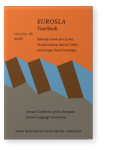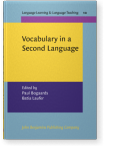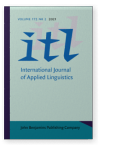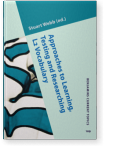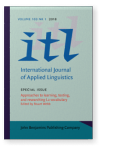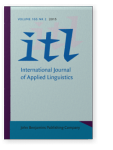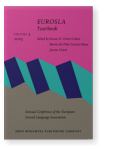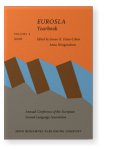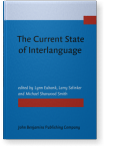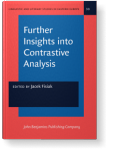Batia Laufer
List of John Benjamins publications for which Batia Laufer plays a role.
Yearbook
Title
Vocabulary in a Second Language: Selection, acquisition, and testing
Edited by Paul Bogaards and Batia Laufer
[Language Learning & Language Teaching, 10] 2004. xiv, 234 pp.
Subjects Language acquisition | Language teaching
2021 How well do learners know derived words in a second language? The effect of proficiency, word frequency and type of affix ITL - International Journal of Applied Linguistics 172:2, pp. 229–258 | Article
The study investigates derivational knowledge of second language (L2) learners as a function of four variables: learner proficiency, word family frequency, derived word frequency, and affix type as suggested by two affix difficulty hierarchies. Seventy-nine EFL learners at two proficiency levels… read more
2020 Loanword proportion in vocabulary size tests: Does it make a difference? Approaches to Learning, Testing and Researching L2 Vocabulary, Webb, Stuart (ed.), pp. 95–115 | Chapter
We investigated the effect of English-Hebrew loanwords on English vocabulary test scores when the number of loanwords in the test is random and when it is representative of their proportion in the vocabulary lists from which the test items were taken. 303 EFL learners, speakers of Hebrew as L1,… read more
2018 Loanword proportion in vocabulary size tests: Does it make a difference? Approaches to learning, testing, and researching L2 vocabulary, Webb, Stuart (ed.), pp. 95–114 | Article
We investigated the effect of English-Hebrew loanwords on English vocabulary test scores when the number of loanwords in the test is random and when it is representative of their proportion in the vocabulary lists from which the test items were taken. 303 EFL learners, speakers of Hebrew as L1,… read more
2015 First language attrition without second language acquisition: An exploratory study ITL - International Journal of Applied Linguistics 166:2, pp. 229–253 | Article
We investigate whether Russian immigrants in Israel with little or no knowledge of Hebrew (L2) experience attrition of Russian (L1). We compared immigrants with no knowledge of Hebrew (−Hebrew), immigrants who knew Hebrew (+Hebrew), and monolingual controls on correctness judgment of collocations… read more
2005 Focus on Form in Second Language Vocabulary Learning EUROSLA Yearbook: Volume 5 (2005), Foster-Cohen, Susan H., María del Pilar García Mayo and Jasone Cenoz (eds.), pp. 223–250 | Article
The realization by applied linguists that second language learners cannot achieve high levels of grammatical competence from entirely meaning centered instruction has led them to propose that learners need to focus on form, i.e. to attend to linguistic elements during a communicative activity (Long… read more
2004 Introduction Vocabulary in a Second Language: Selection, acquisition, and testing, Bogaards, Paul and Batia Laufer (eds.), pp. vii–xiv | Miscellaneous
2001 Passive vocabulary size and speed of meaning recognition: Are they related? EUROSLA Yearbook: Volume 1 (2001), Foster-Cohen, Susan H. and Anna Nizegorodcew (eds.), pp. 7–28 | Article
This paper examines the relationship between fluency and vocabulary size, and also between fluency and word frequency level. Fluency was operationalised as the time learners need to recognize meanings of words sampled from different frequency levels. It was measured by a computerised vocabulary… read more
1995 Beyond 2000: A measure of productive lexicon in a second language The Current State of Interlanguage: Studies in honor of William E. Rutherford, Eubank, Lynn, Larry Selinker and Michael Sharwood Smith (eds.), pp. 265–272 | Article
1991 Words you know: how they affect the words you learn Further Insights into Contrastive Analysis, Fisiak, Jacek (ed.), pp. 573–594 | Article
